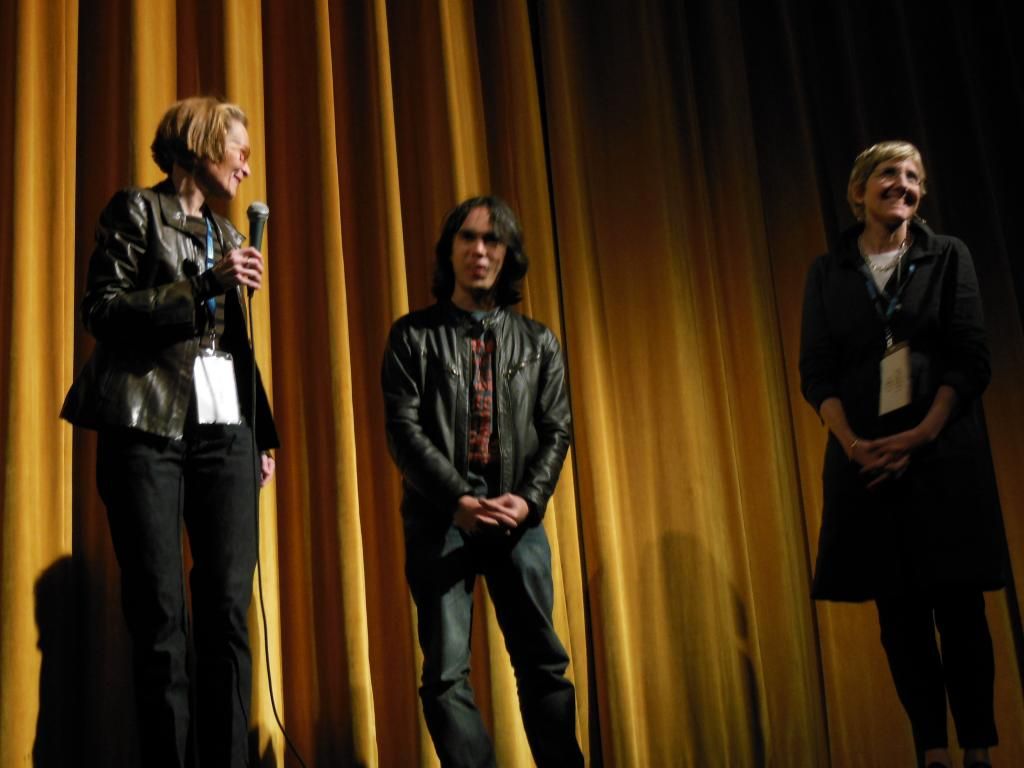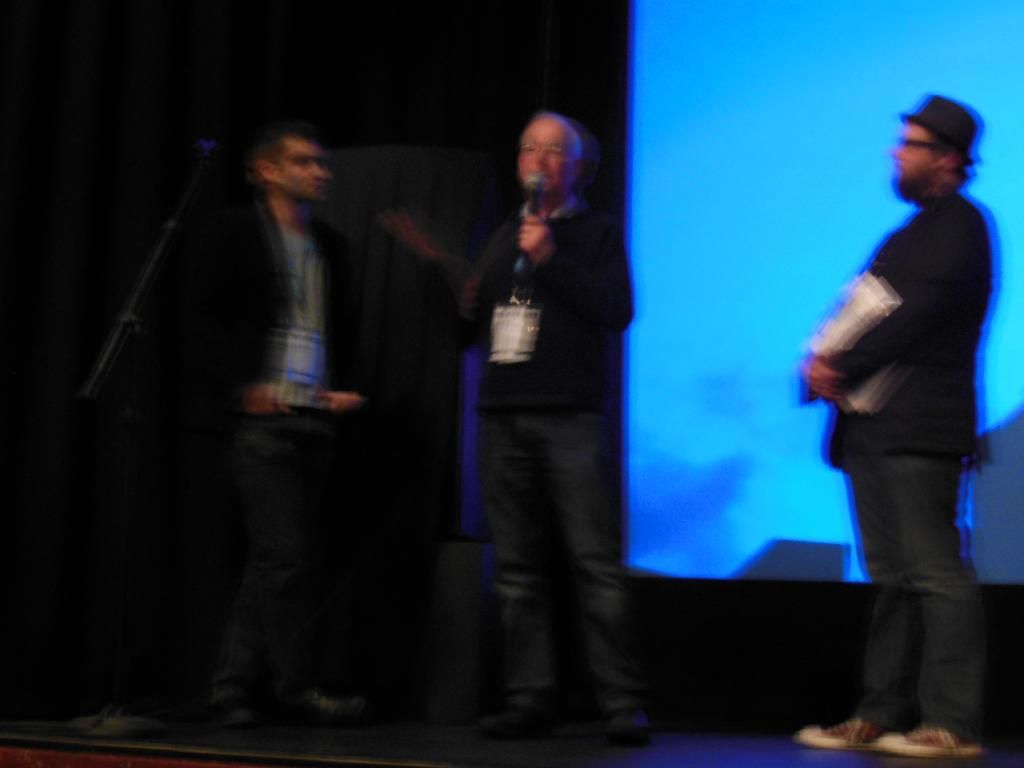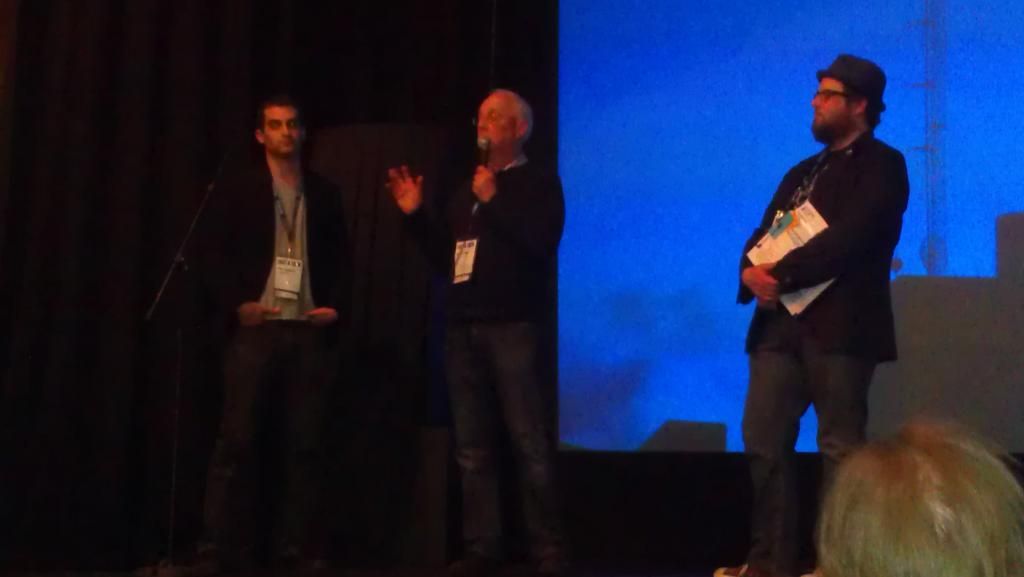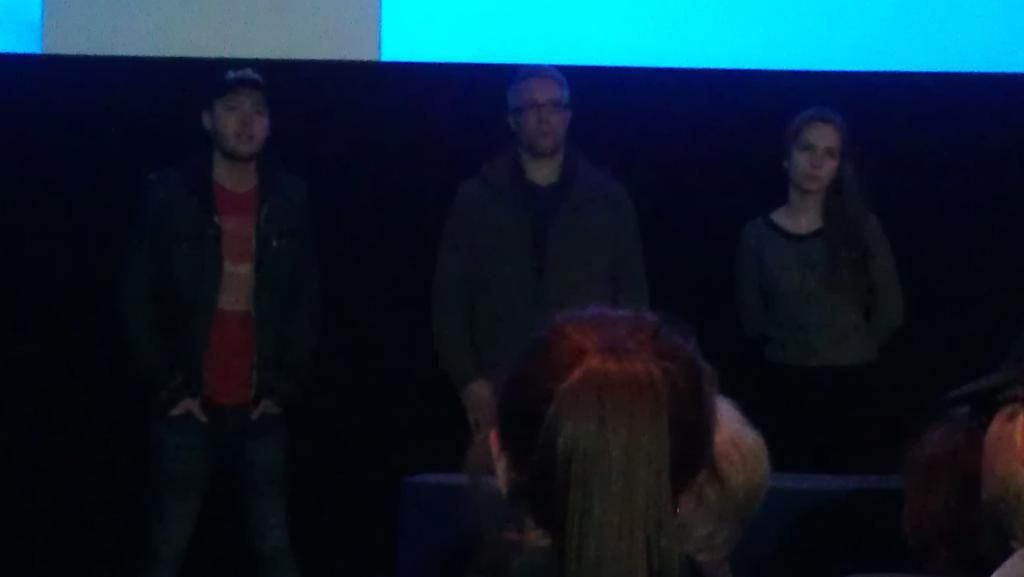Saturday was kind of a wacky day - I got my usual slow start, for a festival weekend day, and would spend some time bouncing back and forth between venues as the day went on, although there was more than enough time scheduled between "blocks" that it wasn't hard to get from one thing to another.
It was a day for busy lines, too - though it's usually easy enough to keep everyone at all five movies at the Somerville Theatre in one line during IFFBoston, they had the Much Ado About Nothing folks broken out during the afternoon, as the cult of Joss Whedon can get folks out for this sort of targeted event. The real surprise was around 9pm; while I waited for Oxyana: I sort of assumed the big crowd was for The Hunt, but apparently The Dirties brought out a big crowd; I wouldn't be surprised if they shuffled it from screen #2 to #5 to fit more people in. It was a rowdy crowd, too, for a movie that didn't really seem to leap off the page of the program for me.
Didn't have time for dinner - Boston Burger Company was packed, and I didn't want to wander much further from Davis Square (probably should have hit Tasty Burger after Computer Chess) - so I grabbed some snacks at the concession stand and Ian (the Somerville's manager) greeted me by name. That always freaks me out a bit - I don't post a lot of pictures of myself online or go introducing myself, so folks recognizing me means I've got to be pretty pretty ubiquitous. It's tough to get to the concession stand during the festival, since you'll often have everybody trying to fill a theater in a five minute period, and as I may have mentioned, with a lot of climbing over people and going back and forth in the theater, not to mention the merch cart and general loitering in the lobby. I half-jokingly suggested on Twitter that the theater ought to have a pushcart to sell some basics to folks waiting in line, but there's probably not enough sidewalk as there is.
OK, movies and guests!

There you have director Mary Jane Doherty, the composer (whose name I didn't get and can't find because the film's web and IMDB pages are shells), and producer Lyda Kuth. Ms. Doherty is a professor at BU, so there were a number of her students in the audience - meaning folks got called on by name and there were some inside jokes during the Q&A. It was a pretty friendly crowd.
SPOILERS!
The most interesting questions, naturally, revolved around the film's main subject Marya defecting to the United States at the climax - did she know what was going on? Did she assist? Did it make finishing the movie with Gabriela and Moises more difficult? No, no, and obviously. She said a couple of interesting things about the situation, though - for one, apparently defecting is almost considered an inevitable part of a ballerina's career in Cuba - every talented dancer walks away from a touring company eventually, although this was the first time a student had done so. The other was that before that happened, the movie was shaping up more as a sort of visual poem, but this is the sort of event that immediately puts everything that came before into a new context - that scene where Maryara's prize money is taken by the school goes from being about how poor Cuba is to how that sort of authoritarian system can push its talented youth away.
It turned out, I was seated in front of a Cuban ballerina. Not Maryara - she's apparently busy in Orlando as a lead dancer in that city's company - but someone who was able to leave Cuba by dint of her mother being Spanish and having dual citizenship.
!SRELIOPS
Add Cuba to the list of places I might like to visit someday, though - every movie I see shot there makes it look so lively, even where it's very poor. The Talk Cinema people do a trip to the film festival, but I think I'd rather wait until the country is more open and on its feet; I'd rather not engage in poverty tourism.

Man, is that the best picture I got of Computer Chess producer Andrew Finnigan (I think), actor Gerald Peary (better known as a local film critic and teacher), and the Brattle's Ned Hinkle? Let me check the phone...

That's better. Anyway, Gerry made a more impassioned plea than usual for folks to donate some money to IFFBoston, stating (not incorrectly) that it's kind of crazy that the festival is in its eleventh year and the folks in charge are still all volunteers, probably burning all their vacation time from their day jobs on this event (between spending a week running it and heading out to other festivals to scout potential selections).
I don't want to spend too much time on the Q&A (or this movie in general), because it kind of annoyed me, highlighting that this time it was mostly improvised (compared to Bujalski's previous films, which were actually tightly scripted but had the awkward stumbling feel of improvisation). It was the kind of discussion that served to push some of my buttons, with a lot of how they were casting people who already embodied the characters, and need a lot of nerds, so who are the nerdiest people you know - well, editors! The movie already had the sort of Big Bang Theory attitude I don't like - where the filmmakers are making the same mocking jokes about nerds as usual, but by throwing a few references in they expect to curry some favor. Combine this with a precious essay in the program and it's become pretty clear that this filmmaker's stuff is just not for me.

Oxyana director Sean Dunne, executive producer Colby Glenn, and (I think) co-producer Cass Marie Greener. No, I don't know why I get better shots from my phone than my real camera at this festival.
Anyway, they seemed like a really great group of folks, with a lot of respect for the people in their film that didn't seem insincere in the least. Like their movie, they were admirably straightforward and plain-spoken about what was going on down there, getting into why they thought towns like Oceana were mostly dealing with prescription drugs rather than meth or harder stuff (isolated enough that it's not yet worth expanding into the area) and why dealing with the problem was so problematic (a real "pray it away" attitude. As I mention in the review, I might have liked hearing some of that in the actual film, but that would have been hard to do with the people involved telling it in their own words.
So, that's Saturday at IFFBoston. Next up: A nearly-as-busy Sunday!
Secundaria
* * * ½ (out of four)
Seen 27 April 2013 in Somerville Theatre #1 (Independent Film Festival Boston, digital)
For someone who has never been to the ballet, I sure tend to find a lot of movies involving the combination of art and athleticism fascinating. Maybe it's the way that the intense discipline necessary to master the form naturally creates great drama as well as great beauty; maybe ballet is a tough enough sell to many Americans that what manages to make it on screen is exceptional. Either way, Secundaria is quite the strong documentary, even if some of its most interesting material isn't about the ballet itself.
Ballet is a big deal in Cuba, and vice versa, even if the island is best known for other styles. Many of the world's foremost companies have Cuban performers taking lead roles, though, with many of them trained at an internationally-renowned academy in Havana. This film follows three who entered the three-year program in 2007: Maryara, who lives in a small apartment with her mother and brother and rides a bus for an hour each way to get to the school; Gabriela, who by contrast comes from a comfortable background (her mother is a hotel accountant and her father is in the military); and Moises, a new friend of Maryara's who comes from one of Havana's poorest neighborhoods. At the start of each year, students are ranked by how they perform in a competition, and while Gabriela is one of the most heralded talents, Maryara surprises by coming in second for the whole school.
That's the story's starting point, and filmmaker Mary Jane Doherty sticks with these characters for the full three years rather than the more common path of choosing, say, a freshman, a senior, and a graduate and following them in parallel. It works out nicely; it means that the various threads don't play as disconnected while it seldom seems forced when the group interacts (although I half-suspect that the decision to make Moises one of the central characters was made later).
Full review on eFilmCritic.
Night Labor
* * ¼ (out of four)
Seen 27 April 2013 in Somerville Theatre #4 (Independent Film Festival Boston, digital)
Documentary filmmakers David Redmon and Ashley Sabin had two features at IFFBoston last year; I saw the one about teenage Russian models in Japan rather than the one about the attempt to open a fish-processing plant in Maine. The latter would have been a natural complement to Night Labor, to the extent that I almost wonder if this film is constructed out of unused footage from the other.
The film focuses almost entirely on one man, Sherman Frank Merchant. He's the sort of fellow who looks his age and then some; there's evidence of a lot of hard living and cigarettes on his face. Now, he clams in the afternoon, eats his catch for dinner, and then works the night shift at the plant. He doesn't talk much, but he doesn't seem to have too many people to talk with.
And so, Night Labor is a documentary that is almost 100% pure observation. We watch Merchant go through what seems like a typical day, with no narration and no particular attempts to add context. Even when Merchant says something, it's not really directed to the camera as much as it's an under-his-breath muttering that brings Popeye to mind when the audience feels generous and that guy wandering the street or riding the bus who is so disgusted or enamored with something that he has to say it out loud. How much the audience enjoys the movie may be directly proportional to how much they see as interesting details and demonstrations of processes with which they weren't previously familiar versus how much seems like banal minutia.
Full review on eFilmCritic.
Computer Chess
* * (out of four)
Seen 27 April 2013 in The Brattle Theatre (Independent Film Festival Boston, digital)
I think I'm done with Andrew Bujalski. I've seen three of his four films, and even the one I kind of liked didn't really impress me. And while I can see some merit in the ones like Computer Chess that bore me to frustration, it's not enough. This thing is just not clever enough to go without a story.
Sure, it sort of looks like it has a story: In the late 1970s/early 1980s, there's an annual convention where the developers of various chess-playing computer programs set their creations against each other round-robin style. The winner will play host and chessmaster Pat Henderson (Gerald Peary), although at the time, the idea that a computer could defeat a human being is ludicrous. Among the competitors are a team from MIT that includes Peter Bishton (Patrick Riester) and Tom Schoesser (Gordon Kindlmann); one from Cal Tech that includes Shelly (Robin Schwarts), the only girl in the tournament; independent operator Michael Papageorge (Myles Paige), who apparently hasn't booked a room; and a privately-funded team with Martin Beuscher (Wiley Wiggins). There's also a sort of swingers' group sharing the space, and... cats.
Bujalski and his cast of what are, for the most part, non-actors (Wiggins and Paige have prior credits but have been doing other things lately) create a few memorable characters, and a great many others that run together. As is often the case, there's a certain authenticity to their performances, especially since they are by and large editors, computer programmers, and others who can easily handle the retro-technical terms. Paige gets the most memorable character, with Papageorge just cynical and snide enough for his being thwarted to be entertaining but not quite enough to really get on the audience's bad side. Riester's Peter winds up drifting toward the center of the story, and he does project a likable everynerd quality.
Full review on eFilmCritic.
Oxyana
* * * ½ (out of four)
Seen 27 April 2013 in Somerville Theatre #4 (Independent Film Festival Boston, digital)
Addiction to prescription medication is hardly limited to rural America, but it thrives there. The reasons why communities like Oceana, West Viginia have such a serious problem with painkillers like Oxycontin are far from the first concern of this movie, which concerns itself almost entirely with showing the effects, becoming a tragic study in human frailty.
Director Sean Dunne builds the film almost entirely out of interviews with local residents; some are functioning addicts, some are dealers, some are relatives who have tried to get their loved ones into rehab but to no avail. There's a man suffering from cancer and the wife who is determined to go down with him. Young men who left for a little while after graduating from high school who came back to find their friends dying at an astonishing rate, and a dentist shocked at his patients' prescription requests. There's a couple of scenes with the district attorney and other officials, but not many; this isn't a story about enforcement.
They're country folks, in general, plain-spoken and not particularly prone to seeking anyone's pity. They spell out the reasons why they think drug abuse has become so endemic in towns like Oceana both as a trend and for themselves personally, and that they can communicate this clearly is somewhat unusual for movies about addiction: There's no metaphor to it, just a simple description of how each feels on and off oxy that makes it more easy than usual for the viewer to put themselves in their positions. Though the idea of "Appalachian Fatalism" is brought up, this tendency to think it's impossible to win brought on by (among other things) decades of exploitation by the coal industry never feels like the end of their arguments; there's a sad willingness to accept responsibility.
Full review on eFilmCritic.
V/H/S/2
* * * ¼ (out of four)
Seen 27 April 2013 in the Brattle Theatre (Independent Film Festival Boston After Dark, digital)
To call last year's V/H/S uneven would be generous; while it managed "pretty good" in a couple of segments, it was awful in more. Still, the good thing about commercially successful anthology films is that sequels need not be encumbered by prior entries' failings, and V/H/S/2 is a great example of this: The new segments feel tighter, more creative, and scarier than last time, with the new filmmakers inspired to top what came before and the returnees opting to step up their game.
The opening/wraparound story - "Tape 49" by Simon Barrett - is still kind of stupid; as the premise is apparently that these VHS tapes unleash monsters and/or make their viewers homicidal just by being VHS, and for all the format's shortcomings, I think you have to be a cinematographer to have that reaction. It's more fun than last time, though - the obnoxious bros from last time out have been replaced by a co-ed team of private investigators (Lawrence Michael Levine & Kelsey Abbot), and their pulpy banter is a definite step up, with the whole deal of them recording themselves watching the tapes they find actually making a reasonable amount of sense.
The first one they watch, "Clinical Trials" by Adam Wingard, has a premise borrowed from movies such as The Eye by the Pang Brothers: Guy (Wingard) is outfitted with a prosthetic eye which records everything it sees as part of its engineers' QA process, only to discover that he's now seeing things that normal people can't. Simple premise, but fun - Hannah Hughes soon pops up as a hot, sarcastic mentor figure and Wingard works plenty of good jumps and a fairly impressive escalation into the short's runtime. My biggest complaint is that it feels less like a complete short film than half a feature, stopping rather than ending just when things are starting to get good - or, alternately, getting out before Wingard has to build a boring mythology and get predictable.
Full review on eFilmCritic.
No comments:
Post a Comment